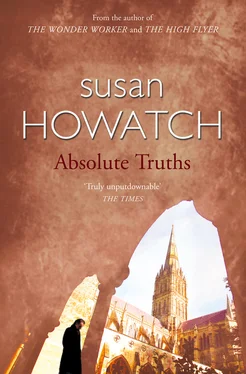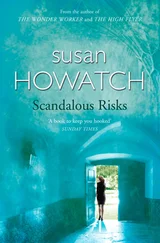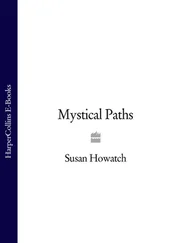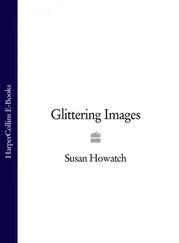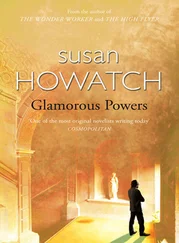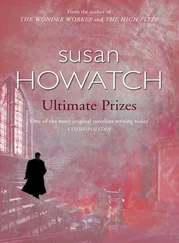‘I detest that girl.’
‘So do I. I can’t understand why Michael finds her so attractive.’
‘Can’t you, Charles? Honestly?’
‘Honestly. I’ve never been attracted to stupid women.’
‘That’s because you’re reacting against your mother.’
‘Nonsense! It’s because I want more from a woman than just sex!’
‘How much more?’
I laughed.
Lyle gave me another lavish kiss and said: ‘That was a sterling performance you gave this afternoon.’
‘At my age I probably won’t be able to repeat it for at least two weeks. I can’t tell you how geriatric I felt this evening when I was watching the news.’
‘Then don’t. Words like “geriatric” bore me. And anyway, if you’re really so enfeebled why were you pacing up and down just now like a sex-starved tiger at the zoo?’
‘More like a mangy old lion in the first stages of senility!’
‘All right, if you’re really so past it, even after several hours’ sleep, let’s just blot out your nightmare by having a friendly cuddle.’
‘What a loathsome phrase!’
‘I’d never have uttered it if you hadn’t behaved as if you were ripe for a coffin! Honestly, British men are the limit sometimes – any Frenchman would be absolutely panting to demonstrate his vitality by this time!’
I tried a pant or two. I do in fact have some French blood flowing in my veins as the result of a Victorian indiscretion unrecorded in the Ashworth family tree, and Lyle had said once that if I had been born in France and escaped my middle-class English upbringing I might have become one of those Frenchmen who drink for hours in raffish Parisian cafés and supplement their long-suffering wives with a succession of pretty mistresses. My comment on this fantasy had been: ‘I’d have missed my golf and cricket,’ but Lyle had retorted: ‘No, you wouldn’t – you’d have been much too busy elsewhere.’
But I could not quite imagine a life in which I was not a clergyman of the Church of England, and I suspected that if I had been a French layman I would have long since expired as the result of sexual exhaustion and liver failure.
‘You’re better off married to an Englishman,’ I said to Lyle.
‘I know, but I always adore being convinced.’
I forgot Desmond and Dinkie, just as Lyle had known I would. I forgot the pornography in the present and the putrefaction in the past. I forgot I was a bishop. I even forgot I was a clergyman. I had entered a world in which only Lyle and I existed, a comforting cocoon in which I could feel secure and cherished, enfolded by a love which excluded all pain, all anxiety and all the baffling complexity of my current existence.
Later Lyle said: ‘I can never resist seducing you when you get as haggard and tormented as a nineteenth-century poet.’
‘I must try and be haggard and tormented more often.’
We laughed, stubbing out our cigarettes, and gave each other one last embrace before falling asleep.
But I had not reached the end of the exhausting stream of crises which had been battering me towards the abyss, and in fact the worst crisis was still to come.
Following my usual routine I rose at half-past five and made myself some tea which I took to my dressing-room. No matter how crowded my timetable was for the day ahead, I devoted at least the first hour to being myself, alone with my Maker; I was recharging my spiritual batteries. While I drank my tea I focused my mind on the coming day and recalled, item by item, all I had to do. Then I prayed that I would do everything in a manner acceptable to God and I prayed for God’s grace and God’s help. Afterwards, if I had no plans to attend a service of matins, I said the office before moving on to my reading.
I read the leading books as recommended by the most important theological and ecclesiastical journals, but this was no chore because I was being myself, indulging in one of my favourite pursuits. I enjoyed a book if I agreed with its propositions, and if I disagreed with them I enjoyed the book even more because I had the opportunity mentally to tear it to pieces. I loved demolishing a slipshod theological construct, just as a counsel for the prosecution loves demolishing the case for the defence in a court of law. I was often asked to write reviews, and my cool, lucid little paragraphs had earned me bitter enemies. Periodically my opponents tried to soothe their wounded egos by demolishing my own books, but this was an uphill struggle for them because I applied to my theology a logic and scholarship which my enemies, if they had any professional integrity, were reluctantly obliged to acknowledge. Revelling in these academic battles I found each clash greatly stimulating.
My spiritual director was keen that I should read exactly what I liked during this period of early morning solitude. I often thought another spiritual director would have queried this self-indulgence, but Jon realised that the more eminent I became in public life the more I needed to have this time to exercise my intellect, my special gift from my Creator. So on that particular morning I read just as I always did, my brain skipping from concept to concept in an ecstasy of intellectual satisfaction, and when I had finished this treat I washed, shaved and dressed before setting off to the Cathedral for matins.
In accordance with tradition, the Cathedral offered the full range of services every day. During the week and on Saturdays these consisted – at the very least – of matins, Holy Communion and evensong, the latter being usually a service sung by the Choir, and on Sundays this weekday programme was elongated into a sung matins and a sung Communion in addition to the sung evensong. (In 1965 the Dean was still refusing to convert the sung Communion into the main Sunday service and refer to it as the Eucharist.) I never cease to be amazed by the idea, prevalent among the unchurched masses, that nothing now happens in cathedrals except the occasional royal wedding, but perhaps this misunderstanding arises from the fact that apart from the chaplain, the guides and the flower-arrangers, no devoted local supporter of the Cathedral would dream of visiting it between ten and four when the tourists rule the roost. The twentieth-century revival of our cathedrals as places of pilgrimage must certainly be welcomed as a manifestation of the Holy Spirit, but the swarming hordes can be disconcerting to anyone in search of peace and quiet.
Leaving the South Canonry on that cold, dank winter morning, I took the short cut across the Choir School’s playing field and began the short walk up Palace Lane towards the wall of the cloisters. The Cathedral, invisible at first in the darkness, began to take shape as I approached so that I was reminded of a sculpture emerging mysteriously from a block of stone. A masterpiece of English perpendicular architecture, built within the short space of forty years with no later additions, its eerie perfection so dominated its surroundings that it seemed to wear the darkness with the nonchalant elegance of a beautiful woman modelling a long black velvet gown. As I drew closer I fancied that the dawn, which was about to break, was making the Cathedral vibrate in anticipation. Beyond the wall nearby birds had begun to sing in the branches of the ancient cedar tree in the cloister garth.
A bishop need have little to do with his cathedral; the running of the building is not his business, even though he remains ultimately responsible for the spiritual welfare of all who work there. However, although tradition required that I should keep a certain distance from those who did run the Cathedral – the Dean and the three residentiary Canons who formed the Chapter – I had felt driven in the early days of my episcopate to set the pace in the matter of daily worship. That was because of the shortcomings of my enemy, the Dean.
Читать дальше
